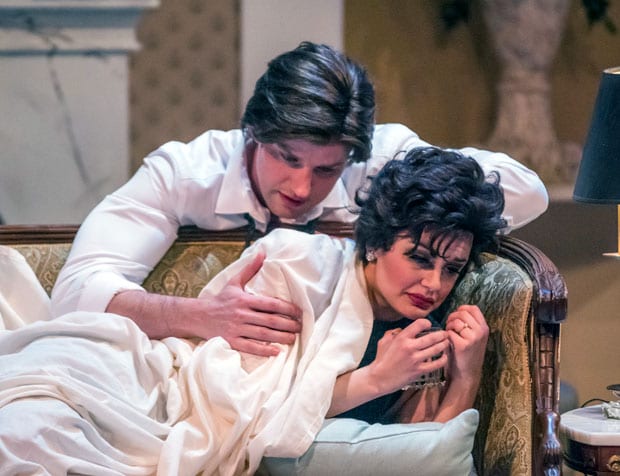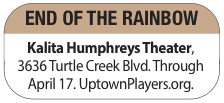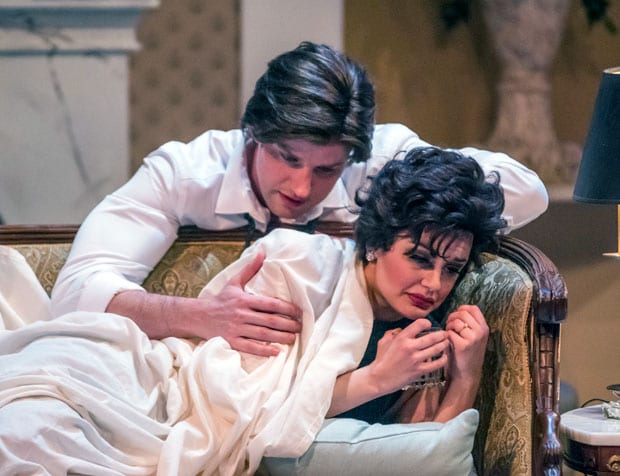Janelle Lutz and company send audiences over the ‘Rainbow’

ARNOLD WAYNE JONES | Executive Editor
jones@dallasvoice.com
When Janelle Lutz, as Judy Garland in the last months of her life, strides onto the stage of the Kalita Humphreys Theater, the audience can’t help but spontaneously cheer. Like Garland, Lutz has that most mysterious quality of a star: charisma. She’s full-bore, don’t hold back, give-it-all-ya-got gumption. Garland probably learned its value as a kid in Vaudeville; I don’t know Lutz’s excuse.
And she holds that level of captivation for the more than two-and-a-half hours of End of the Rainbow, playwright Peter Quilter’s rendering of Judy’s last major concert in London, when pills, booze and a lifetime of failed relationships had really taken their toll. “There’s nothing left,” she sighs in Act 1, realizing that the toughest role she ever played was living up to the legend of Garland herself.
 That spunk is what made Judy the glamorous avatar for gay men for several generations: If she could do it, so could we. That her death, at age 47, helped trigger the modern gay rights movement seems almost inevitable. “What is it with you people? The more she falls apart, the more you adore her,” Judy’s boyfriend Mickey (Alex Ross, good as always) hisses at her gay accompanist (Christopher Curtis, who nails his role). He was wrong, but it was easy to see why he — or she — felt that way. The audience kind of does, too — you can’t help but stare at her, wondering what comes next.
That spunk is what made Judy the glamorous avatar for gay men for several generations: If she could do it, so could we. That her death, at age 47, helped trigger the modern gay rights movement seems almost inevitable. “What is it with you people? The more she falls apart, the more you adore her,” Judy’s boyfriend Mickey (Alex Ross, good as always) hisses at her gay accompanist (Christopher Curtis, who nails his role). He was wrong, but it was easy to see why he — or she — felt that way. The audience kind of does, too — you can’t help but stare at her, wondering what comes next.
Like the play Piaf, Quilters combines dramatic scenes with concert footage, which allows director Cheryl Denson to turn the Kalita into an exquisite cabaret — foggy with stage smoke that suggests a faded memory, a last breath of life. And Lutz delivers there as well. She’s a deft interpreter of the music, giving her own twist to “The Trolley Song” while staying true to Judy’s version. But by the time she wails out “The Man That Got Away” in a plaintive, heartbreaking emotional breakdown set to music, you realize: She could be even better.
End of the Rainbow exudes desperation from every syllable, sweating out its forlornness like a marathon runner, and the anchor is Lutz’s magnificent portrayal. In the hotel scenes, she embodies the junkie’s hairpin turns of mood, but also the genuine need to always try to live up to being Judy Garland. “You could have shoved cables in me and powered Manhattan!” she oddly brags about how lit she has been. Stars burn bright, after all. The brightest ones die out in a blaze that sends worshippers to their knees, aware they are basking in the presence of something magical, something divine.
This article appeared in the Dallas Voice print edition April 8, 2016.














